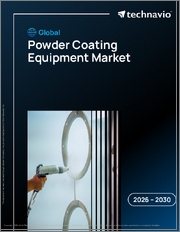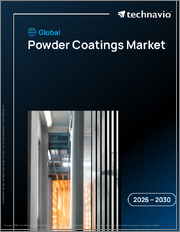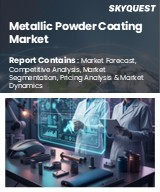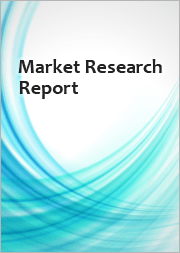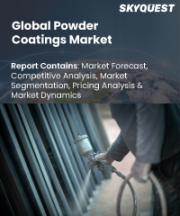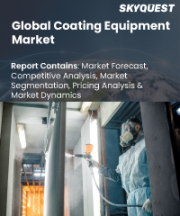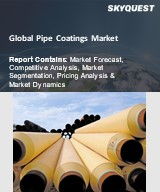
|
시장보고서
상품코드
1736617
분체 코팅 시장 규모 : 수지 유형별, 용도별, 코팅 방법별, 지역 범위별 예측Global Powder Coating Market Size By Resin Type, By Application, By Coating Method, By Geographic Scope and Forecast |
||||||
분체 코팅 시장 규모와 예측
분체 코팅 시장 규모는 2024년에 152억 달러로 평가되었고 2026-2032년에 걸쳐 CAGR 7.42%를 나타내 2032년에는 255억 8,000만 달러에 달할 것으로 예측되고 있습니다.
분체 코팅은 건식 마무리로, 안료와 수지 입자를 미세하게 분쇄한 분체를 정전기로 표면에 도포해, 열로 경화시킴으로써 내구성이 있어, 매끄럽고 고품질의 마무리를 실현합니다.
자동차, 가전제품, 건축, 가구 등의 산업에서 금속, 폴리머 및 기타 재료를 부식, 마모, 화학물질로부터 보호하는 데 자주 사용됩니다.
용제계 도료에 대한 환경 규제가 강화되는 가운데, 분체 코팅은 환경 친화적이고 에너지 효율이 뛰어나 자동차, 건축, 일렉트로닉스 등의 산업에서 고성능으로 지속 가능한 도료에 대한 수요가 높아지고 있기 때문에 대폭적인 확대가 예측되고 있습니다.
분체 코팅 시장 역학
세계의 분체 코팅 시장을 형성하는 주요 시장 역학은 다음과 같습니다.
주요 시장 성장 촉진요인
자동차 산업의 성장 : 자동차 산업의 성장은 분체 코팅 시장의 주요 촉진요인입니다. 자동차 산업의 확대와 장수명으로 내식성이 뛰어난 도료에 대한 요구가 높아져, 제조업체가 환경에 배려한 효율적인 코팅 솔루션을 요구하는 가운데, 분체 코팅 시장을 견인하고 있습니다.
건설 및 건축에 대한 수요 증가 : 건설 업계의 확대는 분체 코팅 수요를 촉진합니다. Global Construction 2030의 조사에 따르면 세계 건설 생산량은 2030년까지 85% 증가해 15조 5,000억 달러에 이를 것으로 예상되고 중국, 미국, 인도가 성장의 57%를 차지할 것으로 예측됩니다.
엄격한 환경 규제 : 환경 규제 강화로 업계는 보다 지속 가능한 코팅 솔루션의 사용을 강요하고 있습니다. 미국 환경보호국(EPA)에 따르면 파우더 코팅은 60% 이상의 전사 효율을 달성할 수 있는 반면, 액체 코팅은 30-60%만 달성할 수 있어 폐기물이 더 적습니다. 유럽연합(EU)의 VOC 용제 배출 지령은 휘발성 유기 화합물의 배출을 제한하고 있으며, 일반적으로 용제를 포함하지 않고 유해한 VOC 배출이 적은 분체 코팅의 사용을 장려하고 있습니다.
분체 코팅의 기술적 진보 : 분체 코팅 기술은 진보 덕분에 보다 다목적성이 높아지고 있습니다. Powder Coating Institute Research에 따르면 세계의 분체 코팅 시장은 2032년까지 152억 달러에 이를 것으로 추정되며, 2023-2032년의 CAGR은 7.42%를 나타낼 전망입니다.
주요 과제
열에 약한 재료에 대한 제한적인 적용 : 분체 코팅은 높은 경화 온도를 필요로 하기 때문에 목재, 플라스틱, 일부 복합재료 등 열에 약한 재료에 대한 적용이 제한되어 시장 성장을 제한하고 있습니다.
색상 및 텍스처 제한 : 액체 페인트와 달리 분체 코팅은 특정 복잡한 색상, 금속성 마감재, 울트라 매끄러운 텍스처를 구현할 수 있는 능력에 한계가 있기 때문에 시각적 변형을 원하는 고객으로부터 존경받을 수 있습니다.
높은 초기 투자 : 경화 오븐 및 정전 스프레이 건과 같은 분체 코팅 장비에는 비용이 많이 듭니다.
얇은 코팅의 어려움 : 분체 코팅은 얇게 적용하기 어려우므로 마무리가 일정하지 않으며 특수한 용도에서는 효율이 떨어집니다.
주요 동향
친환경 솔루션으로의 전환 : 환경에 대한 관심 증가와 액체 페인트에 포함된 휘발성 유기 화합물(VOC)의 제한으로 인해 솔벤트가 없으며 유해 폐기물 발생이 적은 분체 코팅에 대한 수요가 증가하고 있습니다.
자동차 및 소비재에 대한 수요 증가 : 분체 코팅은 내구성, 내식성, 외관의 아름다움으로 인해 자동차 산업 및 가전 산업에서의 사용이 증가하고 있으며 이러한 분야에서 시장 확대를 이끌고 있습니다.
저온 경화의 진보 : 기술의 진보에 의해 분체 코팅은 저온에서 경화하게 되어, 플라스틱이나 목재 등 열에 약한 기재에의 적용이 확대되어, 상업적인 가능성이 높아지고 있습니다.
목차
제1장 서론
- 시장 개요
- 조사 범위
- 전제조건
제2장 주요 요약
제3장 VERIFIED MARKET RESEARCH의 조사 방법
- 데이터 마이닝
- 밸리데이션
- 1차 자료
- 데이터 소스 일람
제4장 시장 개요
- 개요
- 시장 역학
- 성장 촉진요인
- 성장 억제요인
- 기회
- Porter's Five Forces 모델
- 밸류체인 분석
제5장 세계의 분체 코팅 시장 : 수지 유형별
- 개요
- 열경화성
- 열가소성
제6장 세계의 분체 코팅 시장 : 용도별
- 개요
- 소비재
- 자동차
- 일반산업
- 가구
- 건축
- 기타
제7장 세계의 분체 코팅 시장 : 코팅 방법별
- 개요
- 정전기 스프레이
- 유동층
제8장 세계의 분체 코팅 시장 : 지역별
- 개요
- 북미
- 미국
- 캐나다
- 멕시코
- 유럽
- 독일
- 영국
- 프랑스
- 기타 유럽
- 아시아태평양
- 중국
- 일본
- 인도
- 기타 아시아태평양
- 세계 기타 지역
- 라틴아메리카
- 중동 및 아프리카
제9장 경쟁 구도
- 개요
- 각사 시장 랭킹
- 주요 발전 전략
제10장 기업 프로파일
- Kansai Paint Company Limited
- Akzo Nobel NV
- PPG Industries, Inc., LLC.
- Rpm International Inc
- Asian Paints Limited
- Nippon Paint Holdings Co., Ltd.
- Berger Paint India Limited
- Axalta Coating Systems
- Jotun
- The Sherwin-Williams Company
제11장 주요 발전
- 제품 출시/개발
- 합병과 인수
- 사업 확대
- 파트너십과 제휴
제12장 부록
- 관련 조사
Powder Coating Market Size And Forecast
Powder Coating Market size was valued at USD 15.2 Billion in 2024 and is projected to reach USD 25.58 Billion by 2032, growing at a CAGR of 7.42% from 2026 to 2032.
Powder coating is a dry finishing procedure that involves electrostatically applying a powder typically made up of finely ground pigment and resin particles to a surface and then curing it under heat to provide a durable, smooth, and high-quality finish.
It is frequently used in industries such as automotive, appliances, architecture, and furniture to protect metals, polymers, and other materials from corrosion, wear, and chemicals.
With increasing environmental limitations on solvent-based coatings, powder coating is predicted to expand significantly due to its eco-friendliness, better energy efficiency, and rising demand for high-performance, sustainable coatings in industries such as automotive, construction, and electronics.
Global Powder Coating Market Dynamics
The key market dynamics that are shaping the global powder coating market include:
Key Market Drivers:
Growing Automotive Industry: The rising automotive sector is a major driver of the powder coating market. According to the International Organization of Motor Vehicle Manufacturers (OICA), worldwide vehicle production will reach 80.1 million units in 2021, up 3% from 2020. The automobile industry's expansion, combined with rising need for long-lasting and corrosion-resistant coatings, is driving the powder coating market as manufacturers seek environmentally responsible and efficient coating solutions.
Rising Demand in Construction and Architecture: The construction industry's expansion is fuelling demand for powder coatings. According to the Global Construction 2030 research, global construction output will increase by 85% to USD 15.5 Trillion by 2030, with China, the United States, and India leading the way and accounting for 57% of total growth. This increase in construction activity raises the demand for long-lasting, weather-resistant coatings for architectural applications, boosting the powder coating industry.
Stringent Environmental Regulations: Increasing environmental laws are forcing industry to use more sustainable coating solutions. According to the United States Environmental Protection Agency (EPA), powder coatings can reach transfer efficiencies of more than 60%, whereas liquid coatings can only achieve 30-60%, resulting in less waste. The European Union's VOC Solvents Emissions Directive has limited volatile organic compound emissions, encouraging the use of powder coatings, which typically contain no solvents and release low, if any, damaging VOCs.
Technological Advancements in Powder Coating: Powder coating technology is becoming more versatile thanks to advancements. According to a Powder Coating Institute research, developments in low-temperature curing powders have created new markets for heat-sensitive substrates such as wood and plastic. According to Verified Market Research, the global powder coatings market is estimated to reach USD 15.2 Billion by 2032, increasing at a 7.42% CAGR between 2023 and 2032. This growth is largely due to technological advancements that make powder coatings appropriate for a broader range of applications.
Key Challenges:
Limited Application on Heat-Sensitive Materials: Powder coatings require high curing temperatures, which restricts their applicability to heat-sensitive materials such as wood, plastics, and some composites, limiting market growth.
Color and Texture Limitations: Unlike liquid coatings, powder coatings are limited in their ability to achieve certain complex colors, metallic finishes, and ultra-smooth textures, which may alienate clients seeking more visual variation.
High Initial Investment: Powder coating equipment, such as curing ovens and electrostatic spray guns, can be costly. The higher upfront cost compared to standard liquid coatings may dissuade small-scale enterprises from adopting the technology.
Difficulty with Thin Coatings: Applying very thin coatings with powder is difficult, resulting in inconsistent finishes, lower efficiency in specialized applications, and a preference for liquid coatings in industries that require ultra-thin layers.
Key Trends:
Shift toward Eco-Friendly Solutions: Shift to Eco-Friendly Solutions Growing environmental concerns and limitations on volatile organic compounds (VOCs) in liquid coatings are driving up demand for powder coatings, which are solvent-free and produce less hazardous waste.
Rising Demand in Automotive and Consumer Goods: Powder coatings are increasingly being used in the automotive and consumer electronics industries because to its durability, corrosion resistance, and improved visual appeal, which is driving market expansion in these sectors.
Advances in Low-Temperature Curing: Technological advancements are allowing powder coatings to cure at lower temperatures, extending their applicability to heat-sensitive substrates such as plastics and wood, and boosting commercial potential.
Global Powder Coating Market Regional Analysis
Here is a more detailed regional analysis of the global powder coating market:
North America:
North America, especially the United States, has a thriving automotive industry that fuels the powder coating business. According to the US Bureau of Economic Analysis, the automotive industry accounts for 3-3.5 percent of total US GDP. The International Organization of Motor Vehicle Manufacturers (OICA) reports that the United States produced roughly 9.167 million light vehicles in 2021. This high level of automobile production increases demand for powder coatings, which are widely employed for their durability and aesthetic appeal in car components and bodies.
The construction industry in North America is a major driver of powder coatings in architectural applications. According to the US Census Bureau, the value of construction projects in the United States will reach USD 1.57 Trillion in 2021, an 8.2% rise from 2020. Statistics Canada reported that investment in building construction reached USD 19.1 Billion in December 2021, up 1.5% from the previous month as construction activity increases, so does the demand for long-lasting, weather-resistant powder coatings for architectural applications like window frames, doors, and facades.
Asia Pacific:
The Asia Pacific region's fast industrialization, especially in China and India, is driving demand for powder coatings. According to the United Nations Industrial Development Organization (UNIDO), East Asia and the Pacific region's contribution of global manufacturing value added climbed from 31.1% in 2010 to 43.5% by 2021. China alone was responsible for 30.5% of global manufacturing value added in 2021. This industrial growth is driving up demand for long-lasting and cost-effective coating solutions in a variety of industries, including automotive, appliances, and general industrial applications.
Increasing environmental concerns and stiffer restrictions are forcing Asia Pacific companies to use more sustainable coatings. For instance, China's Air Pollution Prevention and Control Action Plan aims to cut volatile organic compound (VOC) emissions by 10% by 2025, compared to 2020 levels. Similarly, India's National Clean Air Programme intends to lower particulate matter concentrations by 20-30% by 2024. These laws encourage the use of powder coatings, which generate zero or near-zero VOCs. A
Global Powder Coating Market: Segmentation Analysis
The Global Powder Coating Market is segmented on the basis of Resin Type, Application, Coating Method, and Geography.
Powder Coating Market, By Resin Type
- Thermoset
- Thermoplastic
Based on Resin Type, the Global Powder Coating Market is segmented into Thermoset, Thermoplastic. The thermoset resin type is the most popular, valued for its greater durability, chemical resistance, and capacity to endure high temperatures, making it suitable for a wide range of applications. The thermoplastic resin type is the fastest-growing segment, owing to its recyclability, ease of processing, and rising demand for environmentally friendly coating solutions across a wide range of industry sectors.
Powder Coating Market, By Application
- Consumer Goods
- Automotive
- General Industries
- Furniture
- Architectural
Based on Application, the Global Powder Coating Market is segmented into Consumer Goods, Automotive, General Industries, Furniture, and Architectural. The automobile market is the major application, driven by the strong need for long-lasting and environmentally friendly coatings in vehicle manufacture. Meanwhile, the furniture industry is the fastest-growing, as customer preferences shift toward attractive, long-lasting finishes like powder coatings, which improve aesthetic appeal and resistance to wear and tear.
Powder Coating Market, By Coating Method
- Electrostatic Spray
- Fluidized Bed
Based on Coating Method, the Global Powder Coating Market is segmented into Electrostatic Spray, Fluidized Bed. The electrostatic spray method is the most common coating method because it provides greater transfer efficiency and a broad range of application capabilities, making it the favored choice for many manufacturers. The fluidized bed approach is the fastest-growing segment, thanks to its capacity to coat complex shapes and produce a thicker, more uniform coating, which is becoming increasingly popular in a variety of industries, including automotive and consumer goods.
Powder Coating Market, By Geography
- North America
- Europe
- Asia Pacific
- Rest of the World
Based on the Geography, the Global Powder Coating Market are classified into North America, Europe, Asia Pacific, and Rest of the World. North America is the most dominating region, owing to the presence of established manufacturing sectors and rigorous environmental rules that encourage the use of eco-friendly coating solutions. Meanwhile, the Asia Pacific area is the fastest-growing market, owing to rapid industrialization, increased urbanization, and rising demand for powder coatings in automotive and architectural applications.
Key Players
The "Global Powder Coating Market" study report will provide valuable insight with an emphasis on the global market. The major players in the market are Axalta Coating Systems Limited, TCI Powder, BASF SE, Jotun, Akzo Nobel N.V., DSM, Kansai Paint Co. Ltd, Nippon Paint Holdings Co. Ltd, The Sherwin-Williams Company, Berger Paints India Limited, Asian Paints PPG Pvt Limited, PPG Industries, Inc.
Our market analysis also entails a section solely dedicated to such major players wherein our analysts provide an insight into the financial statements of all the major players, along with its product benchmarking and SWOT analysis. The competitive landscape section also includes key development strategies, market share, and market ranking analysis of the above-mentioned players globally.
- Global Powder Coating Market: Recent Developments
- In July 2024, Jotun's powder coating division has focused on achieving increasing sustainability standards. They are aiming to increase the usage of powder coatings in industries that have traditionally relied on liquid coatings and are under pressure as a result of rising environmental awareness and regulatory norms. The company sees significant potential for the use of these coatings in new sectors, while scaling up adoption remains a difficulty.
- In June 2024, PPG has created a new line of bio-based powder coatings for the architectural market. These coatings use renewable materials, which helps to reduce the environmental effect of coating applications. PPG is also looking into more efficient manufacturing procedures to reduce waste and increase energy efficiency.
- In February 2024, Valspar introduced a new line of powder coatings with improved corrosion protection for industrial and marine applications. This new product line is intended to satisfy the needs of difficult environmental conditions, establishing the company as a leader in protective coatings.
TABLE OF CONTENTS
1 INTRODUCTION OF GLOBAL POWDER COATING MARKET
- 1.1 Overview of the Market
- 1.2 Scope of Report
- 1.3 Assumptions
2 EXECUTIVE SUMMARY
3 RESEARCH METHODOLOGY OF VERIFIED MARKET RESEARCH
- 3.1 Data Mining
- 3.2 Validation
- 3.3 Primary Interviews
- 3.4 List of Data Sources
4 GLOBAL POWDER COATING MARKET OUTLOOK
- 4.1 Overview
- 4.2 Market Dynamics
- 4.2.1 Drivers
- 4.2.2 Restraints
- 4.2.3 Opportunities
- 4.3 Porters Five Force Model
- 4.4 Value Chain Analysis
5 GLOBAL POWDER COATING MARKET, BY RESIN TYPE
- 5.1 Overview
- 5.2 Thermoset
- 5.3 Thermoplastic
6 GLOBAL POWDER COATING MARKET, BY APPLICATION
- 6.1 Overview
- 6.2 Consumer Goods
- 6.3 Automotive
- 6.4 General Industries
- 6.5 Furniture
- 6.6 Architectural
- 6.7 Others
7 GLOBAL POWDER COATING MARKET, BY COATING METHOD
- 7.1 Overview
- 7.2 Electrostatic Spray
- 7.3 Fluidized Bed
8 GLOBAL POWDER COATING MARKET, BY GEOGRAPHY
- 8.1 Overview
- 8.2 North America
- 8.2.1 U.S.
- 8.2.3 Canada
- 8.2.4 Mexico
- 8.3 Europe
- 8.3.1 Germany
- 8.3.2 U.K.
- 8.3.3 France
- 8.3.4 Rest of Europe
- 8.4 Asia Pacific
- 8.4.1 China
- 8.4.2 Japan
- 8.4.3 India
- 8.4.4 Rest of Asia Pacific
- 8.5 Rest of the World
- 8.5.1 Latin America
- 8.5.2 Middle East and Africa
9 GLOBAL POWDER COATING MARKET COMPETITIVE LANDSCAPE
- 9.1 Overview
- 9.2 Company Market Ranking
- 9.3 Key Development Strategies
10 COMPANY PROFILES
- 10.1 Kansai Paint Company Limited
- 10.1.1 Overview
- 10.1.2 Financial Performance
- 10.1.3 Product Outlook
- 10.1.4 Key Developments
- 10.2 Akzo Nobel N.V.
- 10.2.1 Overview
- 10.2.2 Financial Performance
- 10.2.3 Product Outlook
- 10.2.4 Key Developments
- 10.3 PPG Industries, Inc., LLC.
- 10.3.1 Overview
- 10.3.2 Financial Performance
- 10.3.3 Product Outlook
- 10.3.4 Key Developments
- 10.4 Rpm International Inc
- 10.4.1 Overview
- 10.4.2 Financial Performance
- 10.4.3 Product Outlook
- 10.4.4 Key Developments
- 10.5 Asian Paints Limited
- 10.5.1 Overview
- 10.5.2 Financial Performance
- 10.5.3 Product Outlook
- 10.5.4 Key Developments
- 10.6 Nippon Paint Holdings Co., Ltd.
- 10.6.1 Overview
- 10.6.2 Financial Performance
- 10.6.3 Product Outlook
- 10.6.4 Key Developments
- 10.7 Berger Paint India Limited
- 10.7.1 Overview
- 10.7.2 Financial Performance
- 10.7.3 Product Outlook
- 10.7.4 Key Developments
- 10.8 Axalta Coating Systems
- 10.8.1 Overview
- 10.8.2 Financial Performance
- 10.8.3 Product Outlook
- 10.8.4 Key Developments
- 10.9 Jotun
- 10.9.1 Overview
- 10.9.2 Financial Performance
- 10.9.3 Product Outlook
- 10.9.4 Key Developments
- 10.10 The Sherwin-Williams Company
- 10.10.1 Overview
- 10.10.2 Financial Performance
- 10.10.3 Product Outlook
- 10.10.4 Key Developments
11 KEY DEVELOPMENTS
- 11.1 Product Launches/Developments
- 11.2 Mergers and Acquisitions
- 11.3 Business Expansions
- 11.4 Partnerships and Collaborations
12 Appendix
- 12.1 Related Research






